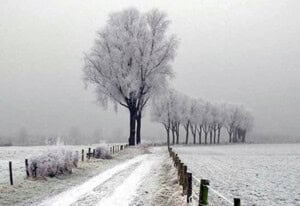We’ve been updating articles on the Planet Natural Pest Problem Solver — a handy resource for the organic vegetable gardener and those interested in Integrated Pest Management in our “Research Center” pull downs on the homepage — and, in particular, going over sections on cabbage worms, asparagus beetles, looper caterpillars and the like. It occurred to us that with many pests lay eggs in decaying plant matter and garden debris, there’s one thing you can do at the end of the season to prepare your garden for winter and put all those seedling stealing, leaf-eating, cabbage-ruining worms and beetles at a distinct disadvantage. Clean-up!
Taking away the foliage where the moths have laid eggs, were pupae hide, where a worm has burrowed into a green stem like a sleeping bag and is hoping for a mild winter, eliminates the chance that these pests will emerge in your garden come spring to start the destructive cycle all over again. Not only does removing the remains of your garden take out the pests hiding there, it also reduces the presence of disease and wilt.

100% COMPOSTABLE
Lawn & Leaf
Don't kill trees to collect leaves! Sturdy enough to handle the toughest jobs.
$6.50Learn moreDon’t kill trees to collect leaves! BioBag® Lawn & Leaf Bags are sturdy enough to handle the toughest yard jobs. Made with GMO-free corn and containing no polyethylene, they can be placed directly in your compost pile. Each box contains 5 full-sized 33-gallon trash bags.
Of course, this is also the time of year you want to cover your soil with a healthy layer of mulch. Just don’t think that what you clean from your garden should go into that mulch or, just as bad, the compost heap. You’ll just be spreading the pests and the problems around.
I’ll admit to confusing the two sometime back before the age of 20 (okay, okay; 25). It took me a couple of full-out gardening years to figure where the pests were coming from and why the strange leaf disease that affected my spinach and chard just got worse and worse. The bacterium were thriving through the winter in my compost heap. I’m guessing most of you were smarter than that.
So this means everything, and I do mean everything, goes; usually into a yard bag and then into the city recycling. The community piles will get a lot hotter, probably hot enough to sterilize, than the one in my backyard. And with the plant residue goes the eggs and pupae of creatures you’d rather not see come next growing season.
After we’ve cleared the soil, we take advantage and test it, then apply amendments as needed. This is an especially good time to test your soil’s pH and make adjustments.
Most pH amendments suitable for organic gardening, including things like pH-raising oyster shell lime and even acid-boosting elemental sulfur, need a period of time to take effect. Getting them down ahead of cold weather, then covering with a good clean mulch, gives them a chance to work into the soil before spring planting.

The mulch you spread should also consider your soil’s pH. You wouldn’t want to put pine needles on ground that’s already acidic, or sawdust on ground that’s nitrogen-challenged (sawdust actually consumes nitrogen as it decomposes). And it goes without saying that it should be seedless. Stay away from pasture cuttings and other hays. But don’t be afraid of good old straw. Leaves make a good mulch, though they’re prone to pack and decompose slowly.
One disclaimer: removing eggs and pupae of cabbage and other type of worms doesn’t necessarily mean you won’t see them again next year. Many worms, in their adult stage, travel as moths great distances in the spring, some as far as 200 kilometers, to reach new fields. They even blow north into areas where they wouldn’t otherwise have survived the winter. Still, removing any stage of the worm in the fall gives you an advantage. It’s a lot easier to spot moths and remove eggs when they’re first deposited, stopping them before they become destructive larvae, rather than deal with two or even three established stages of the worms in your garden.
So clean -up. This North Carolina Cooperative Extension article not only goes into more detail on fall cleaning and mulching, but, in case you’ve got time to kill, suggests a few other fall tasks to accomplish. As if you need to be told…











